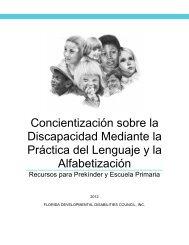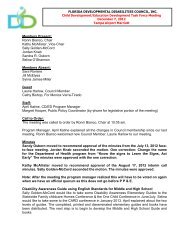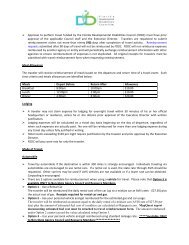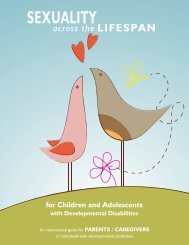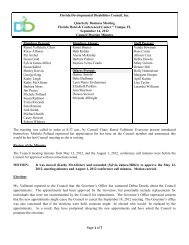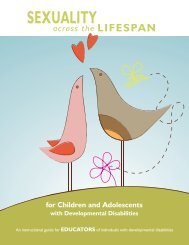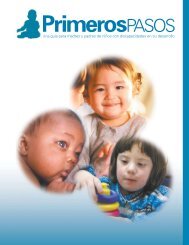Planning Ahead - Florida Developmental Disabilities Council
Planning Ahead - Florida Developmental Disabilities Council
Planning Ahead - Florida Developmental Disabilities Council
- No tags were found...
Create successful ePaper yourself
Turn your PDF publications into a flip-book with our unique Google optimized e-Paper software.
Person-Centered Care. The needs of the family member should be placed above those of thehealth care professionals. This may require revising the method of administering treatment tomeet the special needs of the family member. (For example, sometimes it is difficult for a personwith cerebral palsy to lie on the examination table without special assistance.) Conductingexaminations may require simple explanations of what the patient can expect, both in terms ofloss of privacy and the degree of discomfort.Continuity of Care. Seeing the same physician, nurse, or therapist is important to a person witha disability. When referral must be made to specialists, the transition should be coordinated bythe doctor and his staff, and be fully explained to the patient and the family.Comprehensiveness of Care. Health care, to the extent possible, should be comprehensive.Medical care should not be isolated from other aspects of the person’s life. It should be the responsibilityof the person and family members, or a medical case manager, with the assistanceof medical professionals to see that medical care is incorporated into the home, work and socialaspects of the patient’s life. It should also address preventative health care using guidelines forage specific examinations.A Community Base. Whenever possible health care should be provided in the communitywhere the person lives. When it is necessary to travel out of the community, the local physicianshould communicate with these out-of-town specialists regarding the needs caused by the disability,as well as provide information related to the medical condition.Individual Empowerment. The opinions of both the individual and the involved familymember(s) should be considered by the medical professionals. They should recognize that tothe extent possible the adult with a disability should make his own decisions, although the familyhas a critical role to play in assuring that the patient understands options and makes decisionsin his best interest. There may be times when a legal process such as limited guardianshipmay be required, especially when medical problems are very serious.SOME COMMON EFFECTS OF AGINGAs they age, persons with developmental disabilities can expect to have many of the commonphysical changes associated with aging. With some types of developmental disabilities agingbegins to occur at an earlier chronological age. Some of the more common physical effects ofthe aging process are:Vision Loss – More light is needed to see; glare may be a problem. Words more than twelveinches away become more difficult to read; sharpness declines. Cataracts may occur and cloudthe lens. Bifocals may be needed.Hearing Loss – Can’t hear sounds at low levels or at high pitches; words seem to run together.Some sounds are lost altogether. A hearing aid may help somewhat.Changes in the Bones and Muscles – Bones are weaker, more brittle; osteoporosis may occur.More body fat and a loss of muscle cells cause a loss of muscle tone, strength and stamina.Persons with Down Syndrome tend to experience certain aspects of aging earlier than mostindividuals. After age 40 changes in sleeping, eating, and behavioral patterns as well as forgetfulnessshould be monitored and may need to be evaluated by the family physician.REMINDER: BE SURE TO ADDRESS HEALTH CARE CONCERNS IS IN THE PERSONAL INFORMA-TION SUMMARY!Chapter 10, Dealing with Health Care Concerns49



